Math Programmes
INFUSING GAMES AND HANDS-ON ACTIVITIES IN OUR MATHEMATICS LESSONS
Games Infusion
The department believes in using games and hands-on activities to engage our students in the process of active learning. As part of the school’s effort to create a conducive learning environment for all students, our teachers have been incorporating hands-on activities using manipulatives in the delivery of our lessons. The use of manipulatives such as Play Money, Fraction discs, interlocking cubes etc. promotes students’ engagement and participation in the learning process. Opportunities are provided for students to discover, process, and apply new information to make their learning authentic.
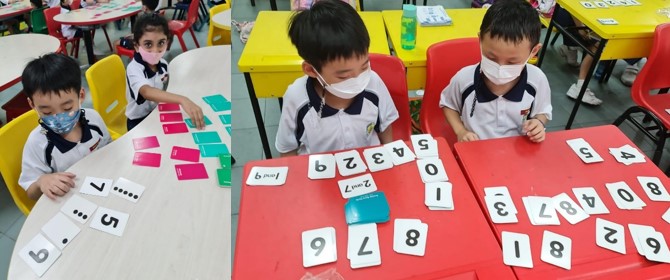
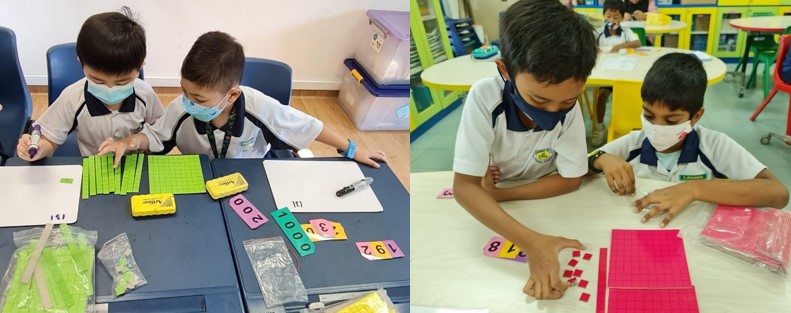
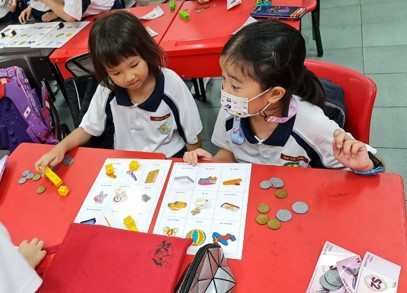
Math Games Week
In Term 3, our Primary 1 to Primary 5 students are provided with a platform to play competitively against their peers in the annual Math Games Week. Games such as Numero, Math Warrior and Fun with Tangrams provide a meaningful situation for the application of mathematical skills. Through games, students build their confidence and develop positive attitudes towards Mathematics, reducing the fear of failures and errors.
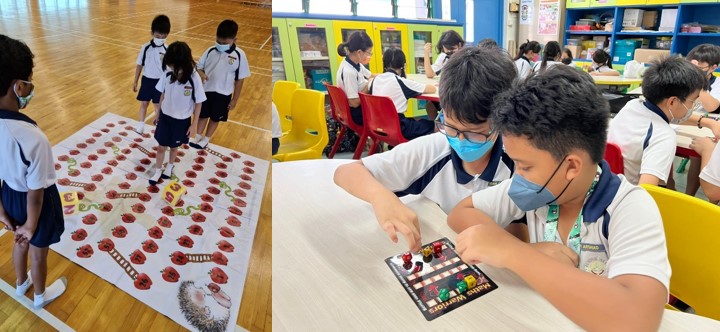
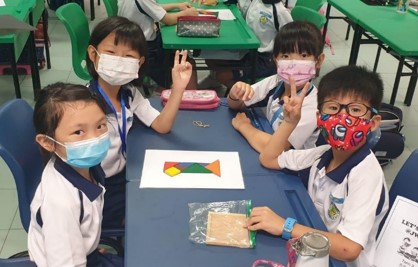
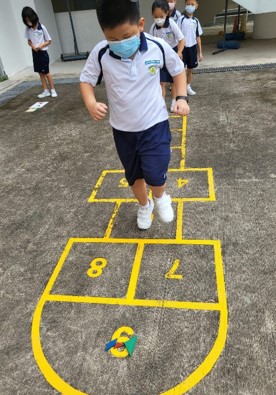
Wireless Experiential Learning
Primary 4 students will work in groups to solve problems in a real-world context and learn to explore mathematical ideas in depth. The activity aims to help students make meaningful connections between their learning and the real world, use technology to help them in their problem-solving and, most importantly, find joy in the learning of Mathematics.
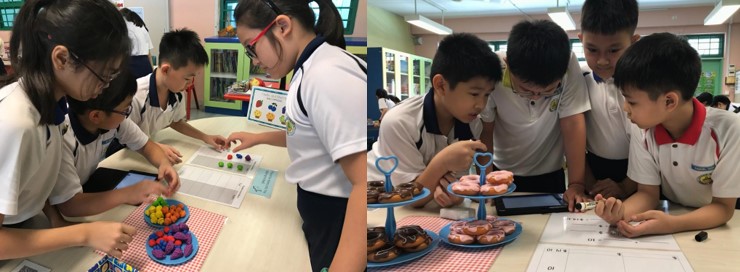
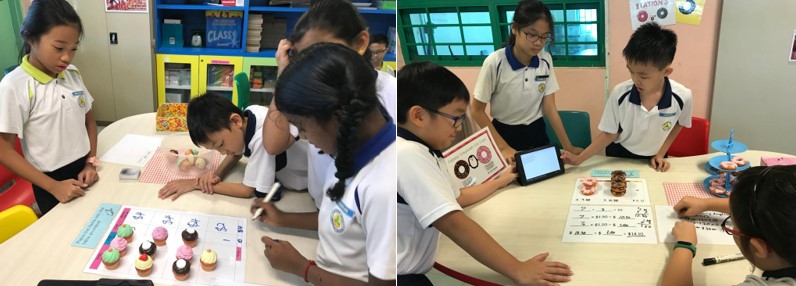
STRENGTHENING THE FUNDAMENTALS BY HAVING FUN WITH MATHEMATICS
FUNDAMATICS
FUNdamatics provides another channel for students to be actively and meaningfully occupied during recess. The games have been carefully curated with the aim of improving students’ factual fluency. We also hope to inculcate in students a greater interest and love for the subject.
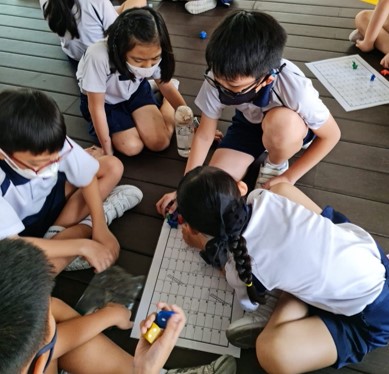
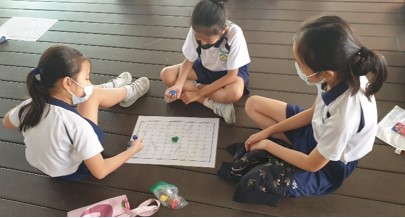
STRETCHING STUDENTS’ POTENTIAL AND ACHIEVING GREATER HEIGHTS
MATH OLYMPIAD
Math Olympiad is an enrichment programme for selected Primary 4 to Primary 6 students with high aptitude and interest in Mathematics. It is conducted by qualified trainers engaged by the school. The students go through rigorous training which will enable them to pick up important non-routine Mathematical concepts and be able to explain and apply them. It also aims to equip the students with the ability to respond critically and accurately to mathematical questions both in class and in Math Olympiad competitions. The training will help to prepare the students for competitions such as Singapore Mathematical Olympiad for Primary Schools (SMOPS), National Mathematics Olympiad of Singapore (NMOS), Singapore and Asian Schools Math Olympiad (SASMO) and Annual Mathlympics. Our students have consistently done well in these competitions, achieving gold, silver and bronze awards.
Excellence 2000 (E2K) Mathematics Programme
E2K is an enrichment programme for students who demonstrate interest and ability in Mathematics. It aims to develop in students mathematical reasoning skills and deepen their conceptual understanding through an inquiry approach. Students will have opportunities to collaborate with their peers and engage in mathematical thinking through puzzles, games and mathematics explorations. The rich learning experiences offered by the programme serve to help students to develop the habits, attitudes and dispositions mathematicians possess, as well as to gain important 21st century competencies such as critical and inventive thinking and effective communication skills.
BRIDGING THE LEARNING GAP IN MATHEMATICS
Learning Support For Mathematics (LSM)
LSM programme is designed to provide early intervention support in Mathematics to students who have not achieved an age-appropriate mathematical age when they enter Primary 1. Students identified for LSM programme are supported by qualified LSM teachers. The LSM class size is kept small, so that students can focus and learn at individual pace to boost self-esteem and elevate self-awareness. Little success will go a long way in motivating these students in the learning of Mathematics.
Improving Confidence and Achievement in Numeracy (ICAN) Programme
ICAN programme aims to level up the confidence and achievement of every low progress student and, in the process, build a strong foundation in literacy and numeracy in the learning of Mathematics. Our school has a group of ICAN-trained teachers who are equipped with the knowledge, skills and resources to support the low progress learners in Mathematics.
To help our Primary 4 low progress learners, we have implemented the ICAN programme outside curriculum hours for selected students weekly. In ICAN, our teachers assess students’ prior knowledge and diagnose their learning gaps. With the understanding of what students know and do not know, our ICAN-trained teachers bridge the learning gaps, scaffold the learning of new knowledge, and provide reinforcement practice and cumulative review to help our students consolidate and remember mathematical concepts. Here, we adopt the ICAN Intervention Framework which embraces 8 key principles of effective intervention, namely Routines and Norms, Diagnosis and Feedback, Confidence and Motivation, Key Ideas and their Connections, Explicit and Direct Instruction, Scaffolding and Progression, Communication and Reasoning, and Practice and Review.
ENHANCING PARENT-SCHOOL PARTNERSHIP
Mathematics Workshops for Parents
The department organises a Parents’ Engagement Session with video recordings sent to the students’ Student Learning Space for Primary 1 to Primary 4. The workshop aims to encourage parent-child conversations and to better engage parents to support their child’s mathematical educational journey. This workshop also provides tips on how parents could guide their child in problem-solving using heuristics skills, relate Mathematics to real life situations and find ways to motivate their child. The recordings are deliberately designed to assimilate how the concepts are scaffolded and taught explicitly in class so that there could be coherence with what is being emphasised at home. Through the strong collaboration between our school and parents, we can help our students discover their strengths and interests in Mathematics.
To support our graduating cohort in their revision, a series of Math Clinic are conducted and hosted on Zoom Webinar in Term 3 by the Mathematics teachers. Essential heuristics questions commonly tested in examinations will be discussed during the sessions. Our students are encouraged to participate and parents are welcome to join in as well.

